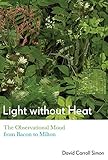Light without Heat : The Observational Mood from Bacon to Milton / David Carroll Simon.
Material type: TextPublisher: Ithaca, NY : Cornell University Press, [2018]Copyright date: ©2018Description: 1 online resource (312 p.)Content type:
TextPublisher: Ithaca, NY : Cornell University Press, [2018]Copyright date: ©2018Description: 1 online resource (312 p.)Content type: - 9781501723421
- Empiricism in literature
- English literature -- Early modern, 1500-1700 -- History and criticism
- Literature and science -- England -- History -- 17th century
- Observation (Scientific method) -- England -- History -- 17th century
- Philosophy of nature in literature
- History Of Science
- History
- Literary Studies
- LITERARY CRITICISM / European / English, Irish, Scottish, Welsh
- nonchalance, affect theory, experimental science, Michel de Montaigne, renaissance literature
- 820.9/004 23
- PR438.S37
- PR438.S37 S56 2018
- online - DeGruyter
| Item type | Current library | Call number | URL | Status | Notes | Barcode | |
|---|---|---|---|---|---|---|---|
 eBook
eBook
|
Biblioteca "Angelicum" Pont. Univ. S.Tommaso d'Aquino Nuvola online | online - DeGruyter (Browse shelf(Opens below)) | Online access | Not for loan (Accesso limitato) | Accesso per gli utenti autorizzati / Access for authorized users | (dgr)9781501723421 |
Frontmatter -- Contents -- Acknowledgments -- Introduction. Atmospheres of Understanding Scientific Emotion and Literary Criticism -- “Nonchalance” and the Making of Knowledge: Francis Bacon after Michel de Montaigne -- The Angle of Thought: Robert Boyle, Izaak Walton, and the Scientific Imagination -- The Microscope Made Easy: Andrew Marvell with Henry Power -- The Paradise Without: John Milton in the Garden -- Postscript -- Notes -- Works Cited -- Index
restricted access online access with authorization star
http://purl.org/coar/access_right/c_16ec
In Light without Heat, David Carroll Simon argues for the importance of carelessness to the literary and scientific experiments of the seventeenth century. While scholars have often looked to this period in order to narrate the triumph of methodical rigor as a quintessentially modern intellectual value, Simon describes the appeal of open-ended receptivity to the protagonists of the New Science. In straying from the work of self-possession and the duty to sift fact from fiction, early modern intellectuals discovered the cognitive advantages of the undisciplined mind.Exploring the influence of what he calls the "observational mood" on both poetry and prose, Simon offers new readings of Michel de Montaigne, Francis Bacon, Izaak Walton, Henry Power, Robert Hooke, Robert Boyle, Andrew Marvell, and John Milton. He also extends his inquiry beyond the boundaries of early modernity, arguing for a literary theory that trades strict methodological commitment for an openness to lawless drift.
Mode of access: Internet via World Wide Web.
In English.
Description based on online resource; title from PDF title page (publisher's Web site, viewed 25. Jun 2024)


